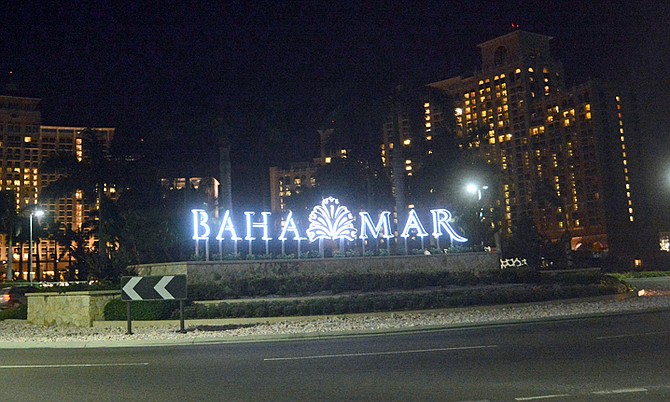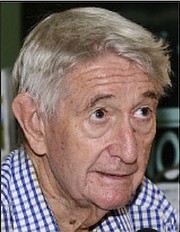While the deadline remains tight, Richard Coulson senses renewed optimism over the April opening of the Cable Beach luxury resort . . .
When I visited the new president of the Baha Mar resort complex last month, a digital countdown clock hung on the wall facing his office. It read 88-23-44-16, marking the days, hours, minutes and seconds until noon on April 21, when a ribbon will be cut and festivities will begin, declaring the first phase at Baha Mar open for business and ready for guest check-in.
Graeme Davis is clearly a man under the gun. The genial 52-year-old American, a veteran of upmarket hotel management after years with Rosewood and Starwood, is squeezed by his Chinese owners, our Prime Minister, the Chinese Export-Import Bank (CEXIM) - still technically the mortgagee-in-possession - and thousands of Bahamians seeking employment, to start earning income from the 23-storey pile of steel and concrete that has loomed over Cable Beach, empty but nearly finished, from its first aborted inauguration in March, 2015.
He also holds the title of President, CTF BM Operations Ltd, the Bahamian subsidiary of Chow Tai Fook Enterprises (CTFE), the business conglomerate controlled by the Cheng family from their Hong Kong base with multi-national investments. Many Bahamians worry that the Chinese government will be dominating our economy - and who wants to be subject to the whims of an authoritarian foreign mega-state? But CTFE is a different animal from the public enterprises directed by the Beijing regime. Created by one of the capitalist billionaires typical of Hong Kong, it operates on hard-headed commercial principles requiring all its far-flung businesses to show a profit, from hotels to jewellery to transportation to real-estate development and minority positions in casinos.
Our press has been reporting heated debate about whether CTFE will truly “own” Baha Mar by the April 21 opening. The facts are clear. As usual in any major business transaction, first a binding agreement is signed, as CTFE has done, followed by conditions to be met before final closing, when it will repay the CEXIM Bank mortgage loan and acquire title to the property. As Mr Davis explained to me, the main condition is that the Chinese construction company known as CCA cleanly complete all the finishing touches to the project. His satisfaction with the contractor’s progress to date assures no repeat of the publicised controversy of 2015. CEXIM also has strong motivation to get the deal completed. At long last they will be able to see this troublesome $2.5 billion loan repaid without suffering too much flak from their image-conscious politico bosses. And CCA will be free to nurture its own new baby, The Pointe project downtown - a separate story still to be told.
Neither Mr Davis nor Senior Vice President Robert “Sandy” Sands, an experienced hold-over from the prior owner, expresses any doubts about successful completion, although they will be hard-pressed to meet the deadline. Ten thousand applicants for the 1,500 initial jobs must be screened and the successful ones hired and trained for their new positions. Casino equipment must be installed. Although air conditioning was never shut down, final decorating, detailing and cleaning of 2,500 long vacant bedrooms and public spaces will be a labour-intensive task. A sales programme that is just getting started must be amplified, with the imminent appointment of a principal marketing/public relations firm and arrangement of welcome tours for travel agencies. The former curator of our National Art Gallery, artist John Cox, has been retained again to organise displays of Bahamian art throughout the buildings.
Mr Davis and his administrative staff will have their hands full co-ordinating the activities of four separate hotels that will be renting from Baha Mar and operating under its banner. The separate Melia has been in full business for several years, but the towering Hyatt, with 1,800 rooms, and the smaller Rosewood (owned by CTFE) and SLS will be coming on stream for the first time. Although physically linked, each will want to publicise its own unique brand, possibly under a rubric like “Rosewood at Baha Mar”. The casino will be managed by a CTFE specialist company, once our authorities grant the expected licence. Only 99 acres of the Jack Nicklaus golf course are leased Crown Land; the remainder of the 992-acre total project acreage, including the 335-acre footprint of the central complex, will be held in fee ownership acquired from the bank mortgagee.
Sophisticated accounting systems will be installed so that a guest in any hotel can bill just one account for all the 40 bars, restaurants and nightclubs scattered through the resort. Locations and concession terms must be arranged for a score of locally-owned retailers who will demand high customer visibility. Spas and watersports must be planned, as well as amenities for the Long Cay private island. Eventually, a sales programme will cover the 300 condominium units in the various hotels, as well as houses or apartments on adjacent land that stretches back to Lake Cunningham.
Reaching Mr Davis’s second-floor executive suite with its glorious view of Goodman’s Bay gave me eerie memories as I trudged through the silent halls of the once vibrant casino, premises now scheduled for demolition. Over two years ago I took the same gloomy path to visit Tom Dunlap, Baha Mar President under chairman/owner Sarkis Izmirlian. An experienced construction executive previously with the Disney group, he cited his five years with Baha Mar as “the most painful in my career” but looked forward to a successful future, which was not to be.
Whether well-liked Izmirlian was unfairly ejected from ownership by the Christie administration and whether the project would have prospered after emerging from Chapter 11 bankruptcy supervised by US courts are issues that still arouse strong feelings and vigorous dissent. The original concept continues; these issues should now be relegated to history and the new owners encouraged towards their projected benefits for our country. Even the published lower estimates put direct new employment at 5,750 to 6,760 persons with payroll of $98-$115 million, with substantially higher figures if related suppliers and other affected business are included. Total economic impact is put at $915 million annually, a notable stimulus for our Gross Domestic Product, although we still need more diversity away from tourism.
From the very beginning, Baha Mar has drawn doubters and nay-sayers who predict that it is too grandiose ever to be profitable; that it will simply divide a static tourist supply with the proven appeal of Atlantis, to the detriment of both; and that our airlift is inadequate. The history of Miami Beach and other tropics resorts tells another lesson: build and they will come, the more the merrier. Certainly the sandy dunes of Collins Avenue became a thriving thoroughfare as every foot of beach frontage was filled by the glittering creations serving as a magnet for mass tourism. Airline and terminal capacity always manage to catch up with growing passenger demand, and the same will happen here.
Some would prefer Cable Beach to revert to a replica of Family Islands charm and tranquility - an unworkable illusion. Fortunately, we are an amazing archipelago that can give us both the dynamic, hustling growth of Nassau and the lonely beaches of cays and islands stretching some 700 miles into the Trade Winds. No other Caribbean nation enjoys the same blessing of geography.
• Richard Coulson is a retired lawyer and investment banker born in Nassau and from a long line of Bahamians. He is a financial consultant and author of A Corkscrew Life - adventures of a travelling financier.






Comments
Well_mudda_take_sic 9 years ago
This article reads like a paid ad for the illegimate owners of Baha Mar; as if Coulson has just secured a financial consulting contract from them. Coulson needs to do his research homework in order to appreciate that it's now much too late for Baha Mar to ever contribute anything of significance to our declining economy. Red China has already flooded Cuba with very significant investments and continues to do so at an ever increasing pace. Red China's investments in Cuba currently exceed those it has made in the Bahamas by a factor of 20, and within the next five years Red China's investments in the Bahamas will be almost negligible and forgettable when compared to its investments in Cuba. Wake up Mr. Coulson - Baha Mar is dead and will stay dead, especially now that Red China is backing what it perceives to be the better horse in our region of the world.
Sign in to comment
OpenID